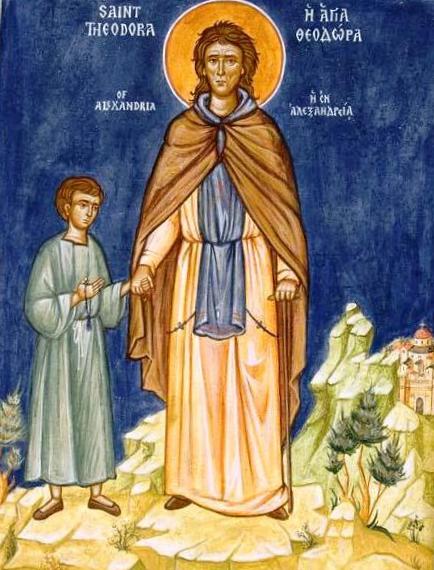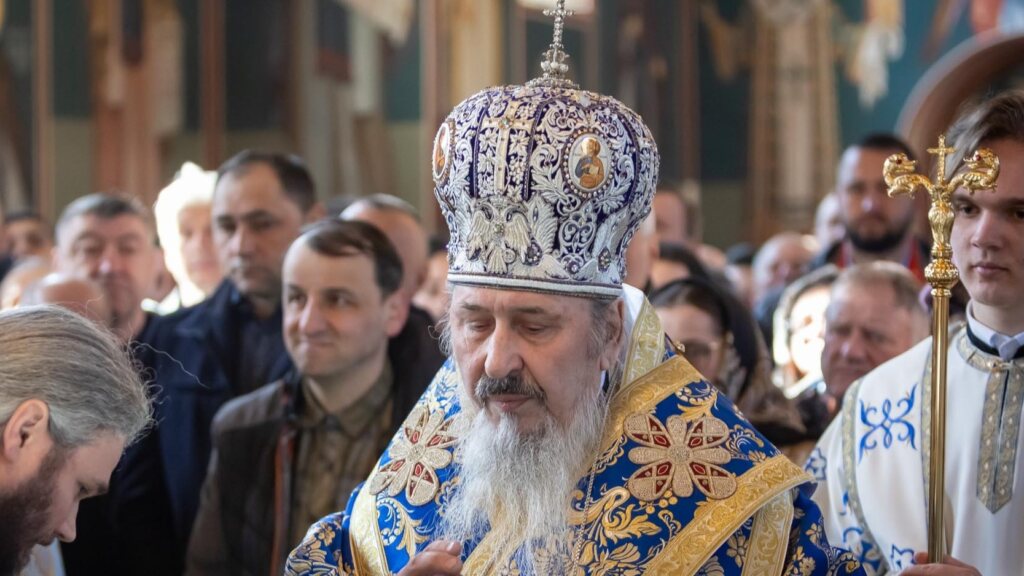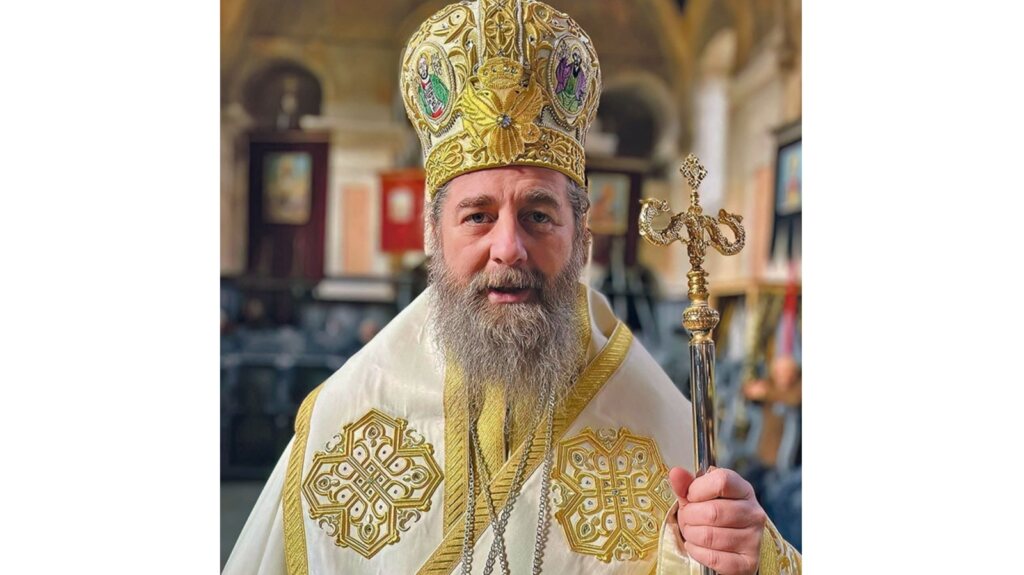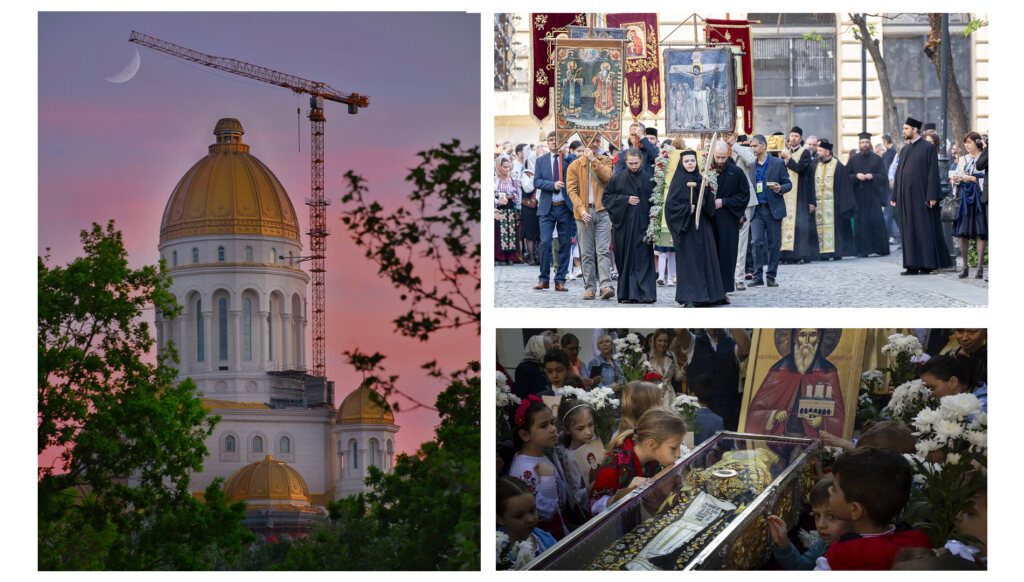Venerable Theodora of Alexandria
She lived with her husband in Alexandria, Egypt. Love and harmony ruled in their family, and this was hateful to the Enemy of salvation. Goaded on by the devil, a certain rich man was captivated by the youthful beauty of Theodora and began with all his abilities to lead her into adultery, but for a long time he was unsuccessful.
Then he bribed a woman of loose morals, who led the unassuming Theodora astray by saying that a secret sin, which the sun does not see, is also unknown to God.
Theodora betrayed her husband, but soon came to her senses and realizing the seriousness of her fall, she became furious with herself, slapping herself on the face and tearing at her hair. Her conscience gave her no peace, and Theodora went to a renowned abbess and told her about her transgression.
The abbess, seeing the repentance of the young woman, spoke to her of God’s forgiveness and reminded her of the the sinful woman in the Gospel, who washed the feet of Christ with her tears and received from Him forgiveness of her sins. In hope of the mercy of God, Theodora said: “I believe my God, and from now on, I shall not commit such a sin, and I will strive to atone for my deed.”
At that moment Saint Theodora resolved to go off to a monastery to purify herself by labor and by prayer. She left her home secretly, and dressing herself in men’s clothes, she went to a men’s monastery, since she feared that her husband would find her in a women’s monastery.
The hegumen of the monastery, in order to test the resolve of the newcomer, would not even bless her to enter the courtyard. Saint Theodora spent the night at the gates. In the morning, she fell down at the knees of the hegumen, and said her name was Theodore from Alexandria, and entreated him to let her remain at the monastery for repentance and monastic labors. Seeing the sincere intent of the newcomer, the hegumen consented.
Even the experienced monks were amazed at Theodora’s all-night prayers on bended knee, her humility, endurance and self-denial. The saint labored at the monastery for eight years. Her body, once defiled by adultery, now became a vessel of the grace of God and a receptacle of the Holy Spirit.
Once, the saint was sent to Alexandria to buy provisions. After blessing her for the journey, the hegumen indicated that in case of a delay, she should stay over at the Enata monastery, which was on the way. Also staying at the guest house of the Enata monastery was the daughter of its igumen. She had come to visit with her father.
Attracted by the comeliness of the young monk, she tried to seduce the monk Theodore into the sin of fornication, not knowing that it was a woman standing before her. Meeting with refusal, she committed sin with another guest and became pregnant. Meanwhile, the saint bought the food and returned to her own monastery.
After a certain while the father of the shameless girl, realizing that a transgression had occurred, began to question his daughter about the father of the child. The girl indicated that it was the monk Theodore. The father at once reported it to the Superior of the monastery where Saint Theodora labored in asceticism.
The hegumen summoned the saint and repeated the accusation. The saint firmly replied: “As God is my witness, I did not do this.” The hegumen, knowing of Theodore’s purity and holiness of life, did not believe the accusation.
When the girl gave birth, the Enata monks brought the infant to the monastery where the ascetic lived, and began to reproach its monks for an unchaste life. But this time even the hegumen believed the slanderous accusation and became angry at the innocent Theodore. They entrusted the infant into the care of the saint and threw her out of the monastery in disgrace.
The saint humbly submitted to this new trial, seeing in it the expiation of her former sin. She settled with the child not far from the monastery in a hut. Shepherds, out of pity, gave her milk for the infant, and the saint herself ate only wild vegetables.
Bearing her misfortune, the holy ascetic spent seven years in banishment. Finally, at the request of the monks, the hegumen allowed her to return to the monastery with the child, and in seclusion she spent two years instructing the child.
The hegumen of the monastery received a revelation from God that the sin of the monk Theodore was forgiven. The grace of God dwelt upon the monk Theodore, and soon all the monks began to witness to the signs worked through the prayers of the saint.
Once, during a drought, all the wells dried up. The hegumen said to the brethren that only Theodore would be able to reverse the misfortune. Having summoned the saint, the hegumen bade her to bring forth water, and the water in the well did not dry up afterwards. The humble Theodore said that the miracle was worked through the prayer and faith of the igumen.
Before her death, Saint Theodora shut herself in her cell with the child and instructed him to love God above all things. She told him to obey the hegumen and the brethren, to preserve tranquility, to be meek and without malice, to avoid obscenity and silliness, to love non-covetousness, and not to neglect their communal prayer.
After this, she prayed and, for the last time, she asked the Lord to forgive her sins. The child also prayed together with her. Soon the words of prayer faded from the lips of the ascetic, and she peacefully departed to a better world.
The Lord revealed to the hegumen the spiritual accomplishments of the saint, and also her secret. The hegumen, in order to remove any dishonor from the deceased, in the presence of the igumen and brethren of the Enata monastery, told of his vision and uncovered the bosom of the saint as proof.
The Enata hegumen and brethren shrank back in terror at their great transgression. Falling down before the body of the saint, with tears they asked forgiveness of Saint Theodora. News of Saint Theodora reached her former husband. He received monastic tonsure at this same monastery where his wife had been.
And the child, raised by the nun, also followed in the footsteps of his foster-mother. Afterwards, he became hegumen of this very monastery.
Troparion — Tone 8
The image of God was truly preserved in you, O Mother, / for you took up the Cross and followed Christ. / By so doing you taught us to disregard the flesh for it passes away / but to care instead for the soul, since it is immortal. / Therefore your spirit, venerable Theodora, rejoices with the angels.
Saint Euphrosynus, the Cook of Alexandria
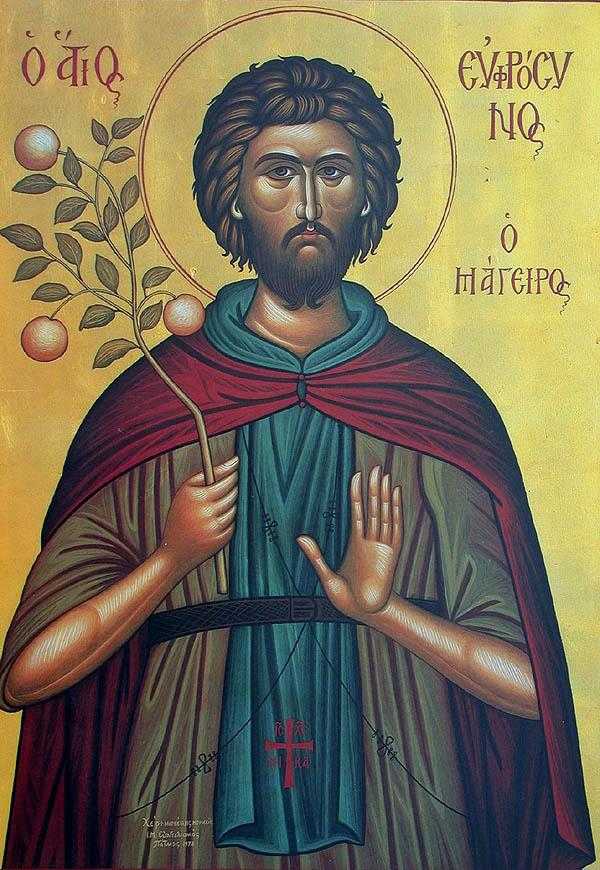
He was from one of the Palestinian monasteries, and his obedience was to work in the kitchen as a cook. Toiling away for the brethren, Saint Euphrosynus did not absent himself from thought about God, but rather dwelt in prayer and fasting. He remembered always that obedience is the first duty of a monk, and therefore he was obedient to the elder brethren.
The patience of the saint was amazing: they often reproached him, but he made no complaint and endured every unpleasantness. Saint Euphrosynus pleased the Lord by his inner virtue which he concealed from people, and the Lord Himself revealed to the monastic brethren the spiritual heights of their unassuming fellow-monk.
One of the priests of the monastery prayed and asked the Lord to show him the blessings prepared for the righteous in the age to come. The priest saw in a dream what Paradise is like, and he contemplated its inexplicable beauty with fear and with joy.
He also saw there a monk of his monastery, the cook Euphrosynus. Amazed at this encounter, the presbyter asked Euphrosynus, how he came to be there. The saint answered that he was in Paradise through the great mercy of God. The priest again asked whether Euphrosynus would be able to give him something from the surrounding beauty. Saint Euphrosynus suggested to the priest to take whatever he wished, and so the priest pointed to three luscious apples growing in the garden of Paradise. The monk picked the three apples, wrapped them in a cloth, and gave them to his companion.
When he awoke in the early morning, the priest thought the vision a dream, but suddenly he noticed next to him the cloth with the fruit of Paradise wrapped in it, and emitting a wondrous fragrance. The priest, found Saint Euphrosynus in church and asked him under oath where he was the night before. The saint answered that he was where the priest also was. Then the monk said that the Lord, in fulfilling the prayer of the priest, had shown him Paradise and had bestown the fruit of Paradise through him, “ the lowly and unworthy servant of God, Euphrosynus.”
The priest related everything to the monastery brethren, pointing out the spiritual loftiness of Euphrosynus in pleasing God, and he pointed to the fragrant paradaisical fruit. Deeply affected by what they heard, the monks went to the kitchen, in order to pay respect to Saint Euphrosynus, but they did not find him there. Fleeing human glory, the monk had left the monastery.
The place where he concealed himself remained unknown, but the monks always remembered that their monastic brother Saint Euphrosynus had come upon Paradise, and that they in being saved, through the mercy of God would meet him there. They reverently kept and distributed pieces of the apples from Paradise for blessing and for healing.
Troparion — Tone 4
You lived in great humility, / in labors of asceticism and in purity of soul, / O righteous Euphrosynus. / By a mystical vision you demonstrated most wonderfully the heavenly joy which you had found. / Therefore, make us worthy to be partakers of it also, by your intercessions.
Tr by oca.org
